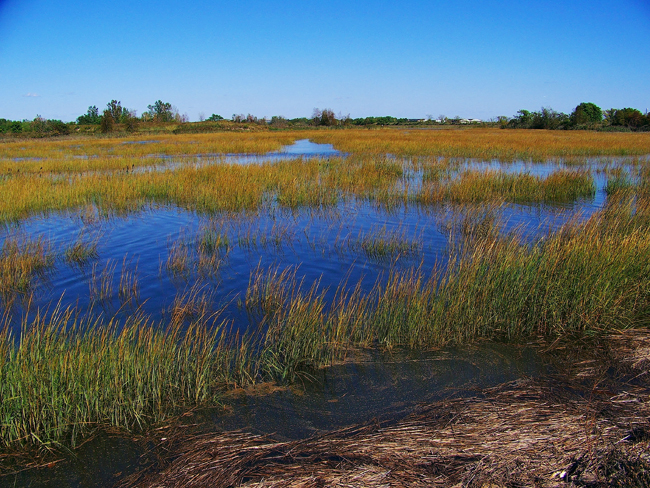
Great Meadows Marsh, a protected salt marsh in Stratford, CT. Credit: Courtesy of the town of Stratford
— By Molly Ingram for WSHU
Stony Brook, NY, March 9, 2023 - Nine research projects studying the Long Island Sound have received funding from the Connecticut and New York Sea Grant programs and the U.S. Environmental Protection Agency’s Long Island Sound Study Research Grant Program.
The nine projects will be supported by $4.2 million in federal funds and $2.1 million in matching funds.
The projects will take place over the next two years.
Coastal restoration tactics
One project, led by Chris Elphick in the Department of Ecology and Evolutionary Biology at the University of Connecticut, will explore coastal restoration tactics in the Stratford Great Meadows.
There are already efforts underway to protect the marshes, which provide a home for wildlife and recreational activities, like fishing, for locals.
Elphick said it’s important to preserve the areas.
“With the rate at which sea levels are rising, a lot of these marshes are changing and deteriorating in many ways,” Elphick said. “And so a lot of work is being done to restore them. And we are studying how effective that is.”
Beach access
Stony Brook University associate professors Anil Yazici and Elizabeth Hewitt will look at barriers to accessing Long Island beaches.
They will shuttle residents who do not have access to transportation to beaches on Long Island Sound, and study the changing attitudes of people who have not historically had access to the coast.
“We're so dependent on cars that if you don't have a car, you're really missing out on a lot of opportunities,” Hewitt said. “And one of those opportunities that this project is focused on is access to natural resources.”
Changing water conditions’ impact on fish and crustaceans
Yong Chen of Stony Brook University will study the impacts of changing water temperature on fish and crustaceans.
He will observe cold and warm water species that are adapting to a new environment due to climate change.
Chen said while it is disheartening to see species struggle to adapt, it is also interesting to see new animals migrate to warmer climates.
“We should see the new opportunity, some new, more abundant, warm water species who will be in those areas,” Chen said. “And maybe we lose some cold water species. But at the same time, we will probably also see new fisheries that can be supported by the warm water, species like a blue crab, for example.”
More Info: New York Sea Grant
New York Sea Grant (NYSG), a cooperative program of Cornell University
and the State University of New York (SUNY), is one of 34 university-based
programs under the National Oceanic and Atmospheric Administration’s
National Sea Grant College Program.
Since 1971, NYSG has represented a statewide network of integrated
research, education and extension services promoting coastal community
economic vitality, environmental sustainability and citizen awareness
and understanding about the State’s marine and Great Lakes resources.
Through NYSG’s efforts, the combined talents of university scientists
and extension specialists help develop and transfer science-based
information to many coastal user groups—businesses and industries,
federal, state and local government decision-makers and agency managers,
educators, the media and the interested public.
The program maintains Great Lakes offices at Cornell University, SUNY
Buffalo, SUNY Oswego and the Wayne County Cooperative Extension office
in Newark. In the State's marine waters, NYSG has offices at Stony Brook
University in Long Island, Brooklyn College and Cornell Cooperative
Extension in NYC and Kingston in the Hudson Valley.
For updates on Sea Grant activities: www.nyseagrant.org has RSS, Facebook, Twitter, Instagram, and YouTube links. NYSG offers a free e-list sign up via www.nyseagrant.org/nycoastlines for its flagship publication, NY Coastlines/Currents, which is published quarterly.